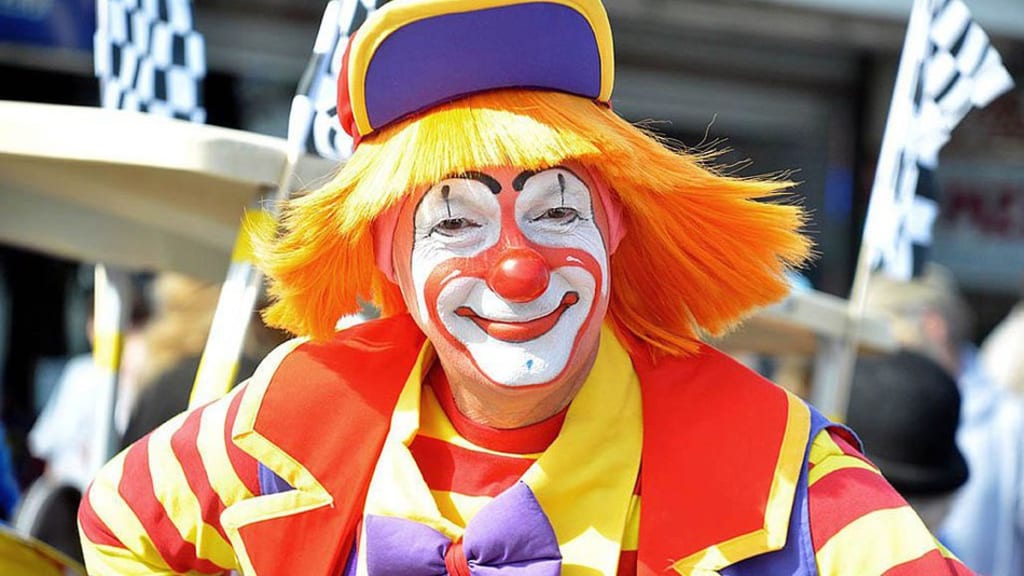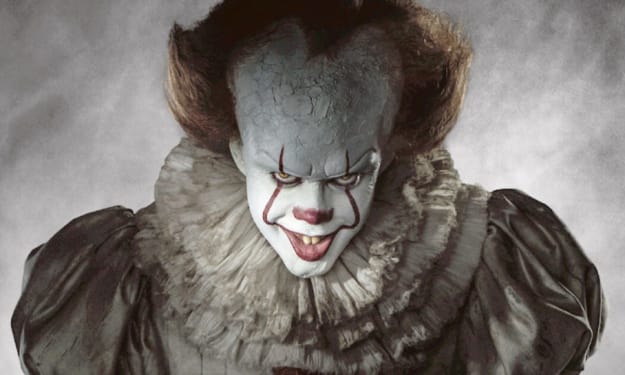Why Are We Scared of Clowns?
Why does a character who is meant to entertain children so often end up in horror films?

You know what clowns are—typically men wearing white makeup, a big wig, and a big nose that are hired to entertain children at birthday parties or at the circus. So why do we also see these seemingly innocent people as creepy?
By the way, I'm not talking about a full blown phobia of clowns. This is unofficially referred to as coulrophobia and is actually extremely rare. It's so rare it's not a phobia recognized by the World Health Organisation. We also don't have much information on it because it's way more common in children than in adults and conducting psychological tests on children comes with a boatload of ethical problems.
But evidence shows that we are all a little bit creeped out by clowns—even if we don't run away from them whilst screaming. According to Frank McAndrew, a psychologist at Knox University in Illinois, most people have a “healthy apprehension” in regards to clowns. He explains further by saying:
“We don’t enjoy seeing them as they make us uneasy. It’s not a phobia... but it’s not a pleasant experience.”
So why is this the case? Well, psychologists have come up with a few possible reasons.
A modern explanation could be because we're all familiar with the 1986 Stephen King novel/1990's film/2016's remake of said film/2019's upcoming film called IT. Pennywise has been frightening us for decades. This certainly may contribute to our fear of clowns but it can't be the only reason. People were scared of clowns before the book's release and Stephen King must have known this to write the book in the first place. So what else could be contributing?
Another theory is that clowns are natural tricksters and part of their act is to play pranks on us. Whilst this can be funny for people watching, it's not always funny if you're the one being pranked. This results in us naturally being on our guard when clowns are around. We become distrusting of them and therefore uncomfortable when they are around.
The way clowns physically look also contributes to why we may find them unsettling. Freud and many psychologists after him support the idea of the "uncanny." This is where something looks human and we recognize it as human, but something just seems a bit... off. This is also one of the reasons why some people are unsettled by dolls and mannequins. A clown's heavy makeup and over-exaggerated features may have been intended to be funny, but just ended up creeping us out.
To tie into this, a clown's makeup also masks their facial expressions. Humans are very social creatures and we rely heavily on facial expressions to get our feelings across. With clowns, we can't do that—the expression is a fixed smile, conveying permanent happiness. We know that permanent happiness is impossible, so this unsettles us because our brain thinks it's false happiness and we start to wonder what they're hiding.
Situations also contribute to our fear of clowns. For example if you see a clown at a circus you are much less likely to be scared of it than if you saw one standing in the middle of the woods. Why is there a clown in the circus? It's just a guy doing his job and entertaining the audience. Why is there a clown in the woods? It's definitely Pennywise coming to eat you.
So there you have it—a few possible reasons why clowns make us uncomfortable. Of course, it's important to remember that clowns are not bad guys outside of Hollywood—they're just ordinary people trying to make a living through entertaining us (well... bar the "killer clowns" epidemic that happened in 2016, but those weren't real clowns). Whilst our concerns are not irrational, once we start to understand why we find them so unsettling, we can work towards working through our problems with clowns and finding them funny again.
About the Creator
Nathaniel Corns
A 21 year old trans man stumbling his way through life. Recent English Literature and Film Studies graduate. Pagan, activist, bisexual.






Comments
There are no comments for this story
Be the first to respond and start the conversation.